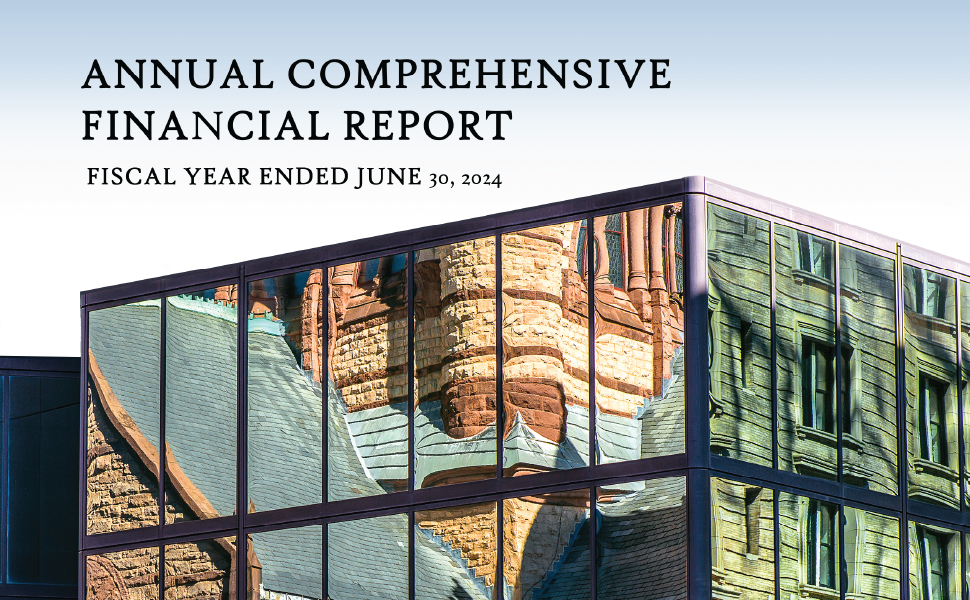Office of the Comptroller files Fiscal Year 2024 Annual Comprehensive Financial Report
Today, Comptroller of the Commonwealth William McNamara announced the filing of the Commonwealth’s Annual Comprehensive Financial Report (ACFR) for Fiscal Year 2024, the period that ended June 30, 2024. Among the major highlights published in the ACFR:
- The total governmental funds balance sheet reflected a total fund balance of $23.547 billion as of June 30, 2024. This is a net increase of $4.537 billion from the beginning of the fiscal year. This comprises $104.985 billion in revenues and other financing sources compared to $100.448 billion in expenditures and other financing uses.
- The General Fund, inclusive of the Commonwealth Stabilization (“Rainy Day”) Fund and the Transitional Escrow Fund, had a fund balance of $15.451 billion at the end of Fiscal Year 2024. This reflects an increase of $836 million, or 5.7% from the end of Fiscal Year 2023.
- The total “government-wide” or “primary government” net position (which includes business-type activities of unemployment insurance, paid family and medical leave, and higher education) stood at a deficit of $60.208 billion as of June 30, 2024; this represents a $3.438 billion decrease in the amount of the deficit. Major reasons for this deficit include debt issued by the Commonwealth for road/bridge assets owned by the Massachusetts Department of Transportation (MassDOT), capital grants and expenditures for state authorities and municipalities, Massachusetts School Building Authority debt/grants payable, and unfunded pension and retiree health benefits.
- The net position of the Commonwealth’s business-type activities increased by $1.062 billion, due to surpluses in all components of those activities. The net position stood at $7.183 billion at the end of Fiscal Year 2024.
- Total revenues of the primary government increased by $3.488 billion, or 3.8%, to $94.514 billion. The revenue increase is due largely to growth in tax revenues, which increased by $1.384 billion, as well as increases in tobacco settlement proceeds, investment earnings, and growth in charges for services.
- Total expenses of the primary government increased by $3.925 billion, or 4.5%, to $91.076 billion, mainly due to an increase in education and transportation spending.
- The number of Commonwealth of Massachusetts employees increased by a net of 3,332 full-time equivalent employees, to a total of 90,758.
The full report can be found online at https://www.macomptroller.org/annual-comprehensive-financial-reports/.
The ACFR includes an auditor’s report prepared by the Commonwealth’s independent auditor, CLA (CliftonLarsonAllen, LLP).
Said Comptroller William McNamara, “The Annual Comprehensive Financial Report shows the continued strong financial condition of the Commonwealth of Massachusetts at the end of Fiscal Year 2024. The report reflects the work done by the Administration, the Legislature, and departmental staff throughout the Commonwealth, to steward and report on public funds in a transparent and complete manner. I want to thank the Statewide Financial Reporting Team, led by Assistant Comptroller & Chief Financial Reporting Officer Pauline Lieu, Deputy Chief Financial Reporting Officer Tamia Buckingham, and Senior Advisor Howard Merkowitz, who work tirelessly year after year to organize, analyze, and present this insightful and detailed reporting.”
About the Annual Comprehensive Financial Report
The ACFR is prepared in accordance with Generally Accepted Accounting Principles in the United States of America, as defined for governments by the Government Accounting Standards Board.
The objective of the ACFR is to provide a clear financial picture of the government of the Commonwealth of Massachusetts as a single, unified entry, in a format that makes the report easily comparable to other states. The ACFR incorporates activity from more than 150 departments, including the various agencies, boards, and commissions, the 25 institutions of higher education, the judicial and legislative branches of government, constitutional offices, as well as 41 separate, independent public authorities.
This report presents the Commonwealth’s financial information on two bases of accounting, each serving a different purpose:
- The fund perspective statements present governmental operations on a modified accrual basis of accounting, or “fund perspective”, which shows how the Commonwealth is able to meet its short-term obligations through “currently available resources”.
- The government-wide perspective combines all government and business-type activities in a statement of net position and a statement of activities, presenting all functions on a full accrual basis of accounting, including long-term assets such as capital assets and long-term liabilities such as debt and retiree pensions and health insurance benefits.
About the Office of the Comptroller
The Office of the Comptroller of the Commonwealth of Massachusetts (CTR) is an independent and apolitical agency charged with overseeing the Commonwealth’s financial systems, preparing the annual financial reporting, and managing the external single audit process. In addition, CTR oversees the Commonwealth’s general ledger, payroll and vendor management, trains state employees on risk mitigation, and operates the Commonwealth’s financial system.
As stewards of the public trust, we aspire to inspire confidence by maintaining our core principles: clarity, integrity, and accountability.
The powers and obligations of the Office of the Comptroller are generally dictated by M.G.L. c. 7A.
The Comptroller of the Commonwealth is William McNamara, who has served as the 20th Comptroller since February 2020.
